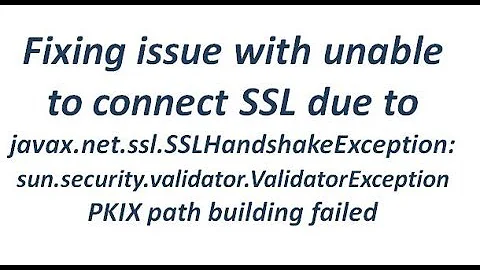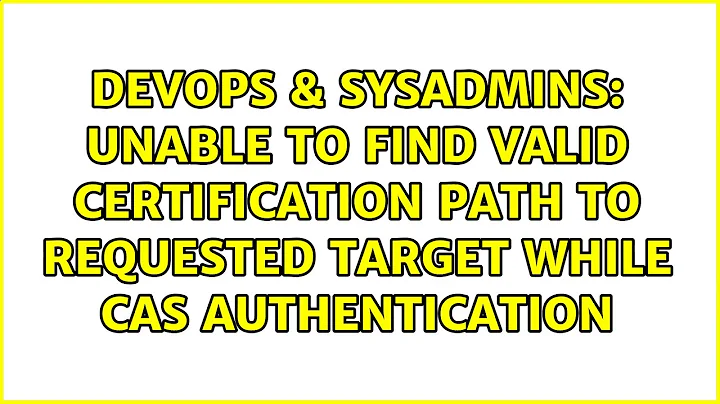Unable to find valid certification path to requested target while CAS authentication
The issue was resolved by adding certificate to trustStore instead of keyStore. I converted pem certificate to der format and added it to Java truststore ($JAVA_HOME/jre/lib/security/cacerts) using keytool. Then I changed keyStore parameters to corresponding trustStore parameters in CATALINA_OPTS. After restart of Tomcat service, everything works.
Related videos on Youtube
Dmitriy Sukharev
Updated on September 18, 2022Comments
-
Dmitriy Sukharev over 1 year
I'm trying to configure CAS authentication. It requires both CAS and client application to use HTTPS protocol. Unfortunately we should use self-signed certificate (with CN that doesn't have anything in common with our server). Also the server is behind firewall and we have only two ports (ssh and https) visible. As far as there're several application that should be visible externally, we use Apache for ajp reverse proxying requests to these applications. Secure connections are managed by Apache, and all Tomcat are not configured to work with SSL. But I obtained exception while authentication, therefore desided to set keystore in CATALINA_OPTS:
export CATALINA_OPTS="-Djavax.net.ssl.keyStore=/path/to/tomcat/ssl/cert.pfx -Djavax.net.ssl.keyStoreType=PKCS12 -Djavax.net.ssl.keyStorePassword=password -Djavax.net.ssl.keyAlias=alias -Djavax.net.debug=ssl"cert.pfx was obtained from certificate and key that are used by Apache HTTP Server:
$ openssl pkcs12 -export -out /path/to/tomcat/ssl/cert.pfx -inkey /path/to/apache2/ssl/server-key.pem -in /path/to/apache2/ssl/server-cert.pemWhen I try to authenticate a user I obtain the following exception:
Caused by: sun.security.provider.certpath.SunCertPathBuilderException: unable to find valid certification path to requested target at sun.security.provider.certpath.SunCertPathBuilder.engineBuild(SunCertPathBuilder.java:174) ~[na:1.6.0_32] at java.security.cert.CertPathBuilder.build(CertPathBuilder.java:238) ~[na:1.6.0_32] at sun.security.validator.PKIXValidator.doBuild(PKIXValidator.java:318) ~[na:1.6.0_32]Meanwhile I can see in catalina.out that Tomcat see certificate in cert.pfx and it's the same as the one that is used while authentication:
09:11:38.886 [http-bio-8080-exec-2] DEBUG o.j.c.c.v.Cas20ProxyTicketValidator - Constructing validation url: https://external-ip/cas/proxyValidate?pgtUrl=https%3A%2F%2Fexternal-ip%2Fclient%2Fj_spring_cas_security_proxyreceptor&ticket=ST-17-PN26WtdsZqNmpUBS59RC-cas&service=https%3A%2F%2Fexternal-ip%2Fclient%2Fj_spring_cas_security_check 09:11:38.886 [http-bio-8080-exec-2] DEBUG o.j.c.c.v.Cas20ProxyTicketValidator - Retrieving response from server. keyStore is : /path/to/tomcat/ssl/cert.pfx keyStore type is : PKCS12 keyStore provider is : init keystore init keymanager of type SunX509 *** found key for : 1 chain [0] = [ [ Version: V1 Subject: CN=wrong.domain.name, O=Our organization, L=Location, ST=State, C=Country Signature Algorithm: SHA1withRSA, OID = 1.2.840.113549.1.1.5 Key: Sun RSA public key, 1024 bits modulus: 13??a lot of digits here??19 public exponent: ????7 Validity: [From: Tue Apr 24 16:32:18 CEST 2012, To: Wed Apr 24 16:32:18 CEST 2013] Issuer: CN=wrong.domain.name, O=Our organization, L=Location, ST=State, C=Country SerialNumber: [ d??????? ????????] ] Algorithm: [SHA1withRSA] Signature: 0000: 65 Signature is here 0070: 96 . ] *** trustStore is: /jdk-home-folder/jre/lib/security/cacerts Here is a lot of trusted CAs. Here is nothing related to our certicate or our (not trusted) CA. ... 09:11:39.731 [http-bio-8080-exec-4] DEBUG o.j.c.c.v.Cas20ProxyTicketValidator - Retrieving response from server. Allow unsafe renegotiation: false Allow legacy hello messages: true Is initial handshake: true Is secure renegotiation: false %% No cached client session *** ClientHello, TLSv1 RandomCookie: GMT: 1347433643 bytes = { 63, 239, 180, 32, 103, 140, 83, 7, 109, 149, 177, 80, 223, 79, 243, 244, 60, 191, 124, 139, 108, 5, 122, 238, 146, 1, 54, 218 } Session ID: {} Cipher Suites: [SSL_RSA_WITH_RC4_128_MD5, SSL_RSA_WITH_RC4_128_SHA, TLS_RSA_WITH_AES_128_CBC_SHA, TLS_DHE_RSA_WITH_AES_128_CBC_SHA, TLS_DHE_DSS_WITH_AES_128_CBC_SHA, SSL_RSA_WITH_3DES_EDE_CBC_SHA, SSL_DHE_RSA_WITH_3DES_EDE_CBC_SHA, SSL_DHE_DSS_WITH_3DES_EDE_CBC_SHA, SSL_RSA_WITH_DES_CBC_SHA, SSL_DHE_RSA_WITH_DES_CBC_SHA, SSL_DHE_DSS_WITH_DES_CBC_SHA, SSL_RSA_EXPORT_WITH_RC4_40_MD5, SSL_RSA_EXPORT_WITH_DES40_CBC_SHA, SSL_DHE_RSA_EXPORT_WITH_DES40_CBC_SHA, SSL_DHE_DSS_EXPORT_WITH_DES40_CBC_SHA, TLS_EMPTY_RENEGOTIATION_INFO_SCSV] Compression Methods: { 0 } *** http-bio-8080-exec-4, WRITE: TLSv1 Handshake, length = 75 http-bio-8080-exec-4, WRITE: SSLv2 client hello message, length = 101 http-bio-8080-exec-4, READ: TLSv1 Handshake, length = 81 *** ServerHello, TLSv1 RandomCookie: GMT: 1347433643 bytes = { 145, 237, 232, 63, 240, 104, 234, 201, 148, 235, 12, 222, 60, 75, 174, 0, 103, 38, 196, 181, 27, 226, 243, 61, 34, 7, 107, 72 } Session ID: {79, 202, 117, 79, 130, 216, 168, 38, 68, 29, 182, 82, 16, 25, 251, 66, 93, 108, 49, 133, 92, 108, 198, 23, 120, 120, 135, 151, 15, 13, 199, 87} Cipher Suite: SSL_RSA_WITH_RC4_128_SHA Compression Method: 0 Extension renegotiation_info, renegotiated_connection: <empty> *** %% Created: [Session-2, SSL_RSA_WITH_RC4_128_SHA] ** SSL_RSA_WITH_RC4_128_SHA http-bio-8080-exec-4, READ: TLSv1 Handshake, length = 609 *** Certificate chain chain [0] = [ [ Version: V1 Subject: CN=wrong.domain.name, O=Our organization, L=Location, ST=State, C=Country Signature Algorithm: SHA1withRSA, OID = 1.2.840.113549.1.1.5 Key: Sun RSA public key, 1024 bits modulus: 13??a lot of digits here??19 public exponent: ????7 Validity: [From: Tue Apr 24 16:32:18 CEST 2012, To: Wed Apr 24 16:32:18 CEST 2013] Issuer: CN=wrong.domain.name, O=Our organization, L=Location, ST=State, C=Country SerialNumber: [ d??????? ????????] ] Algorithm: [SHA1withRSA] Signature: 0000: 65 Signature is here 0070: 96 . ] *** http-bio-8080-exec-4, SEND TLSv1 ALERT: fatal, description = certificate_unknown http-bio-8080-exec-4, WRITE: TLSv1 Alert, length = 2 http-bio-8080-exec-4, called closeSocket() http-bio-8080-exec-4, handling exception: javax.net.ssl.SSLHandshakeException: sun.security.validator.ValidatorException: PKIX path building failed: sun.security.provider.certpath.SunCertPathBuilderException: unable to find valid certification path to requested targetI tried to convert our pem certificate to der format and imported it to trustedKeyStore (cacerts) (without private key), but it didn't change anything. But I'm not confident that I did it rigth.
Also I must inform you that I don't know passphrase for our servier-key.pem file, and probably it differs from password for keystore created by me.
OS: CentOS 6.2
Architecture: x64
Tomcat version: 7
Apache HTTP Server version: 2.4Is there any way to make Tomcat accepts our certificate?




